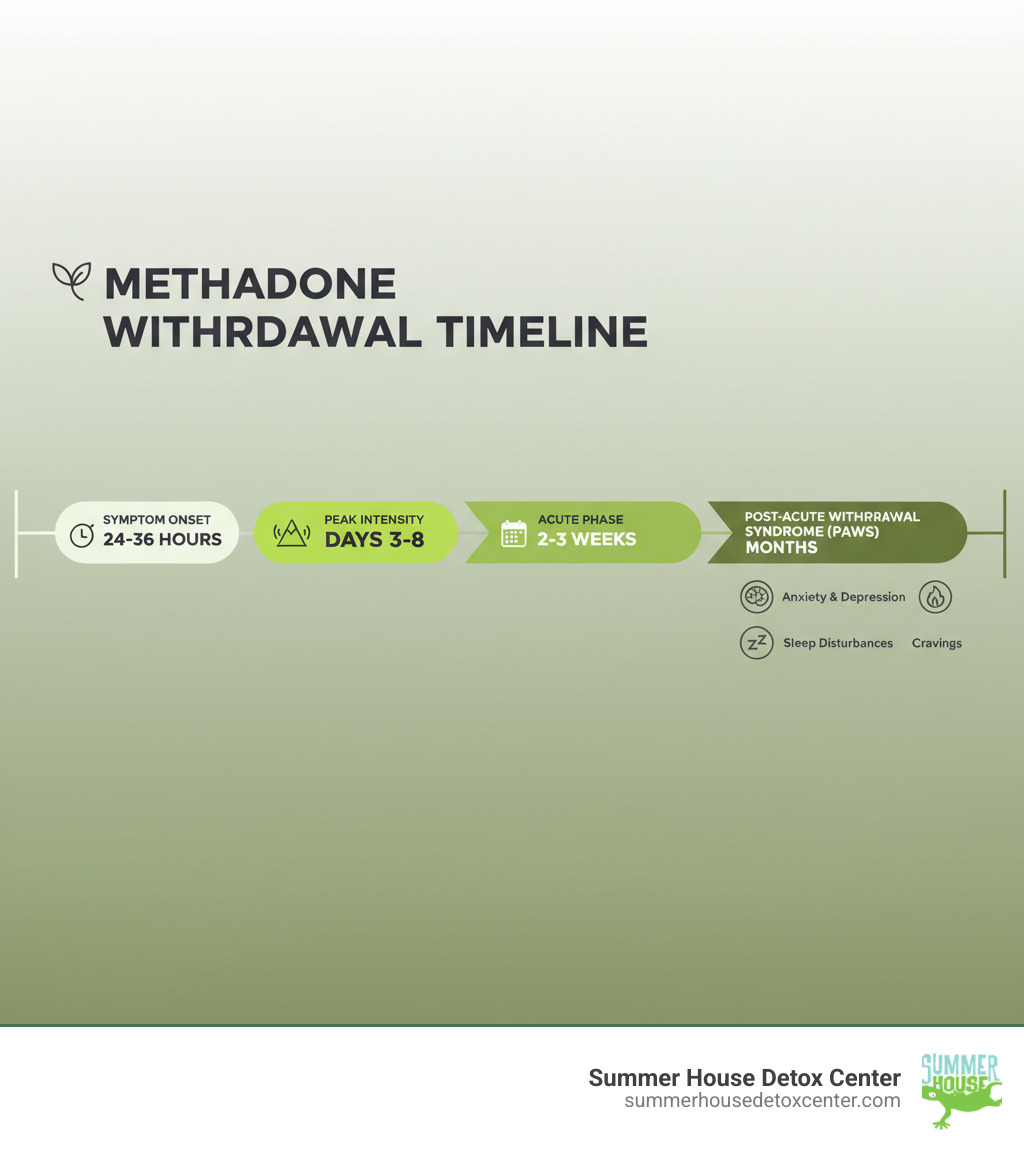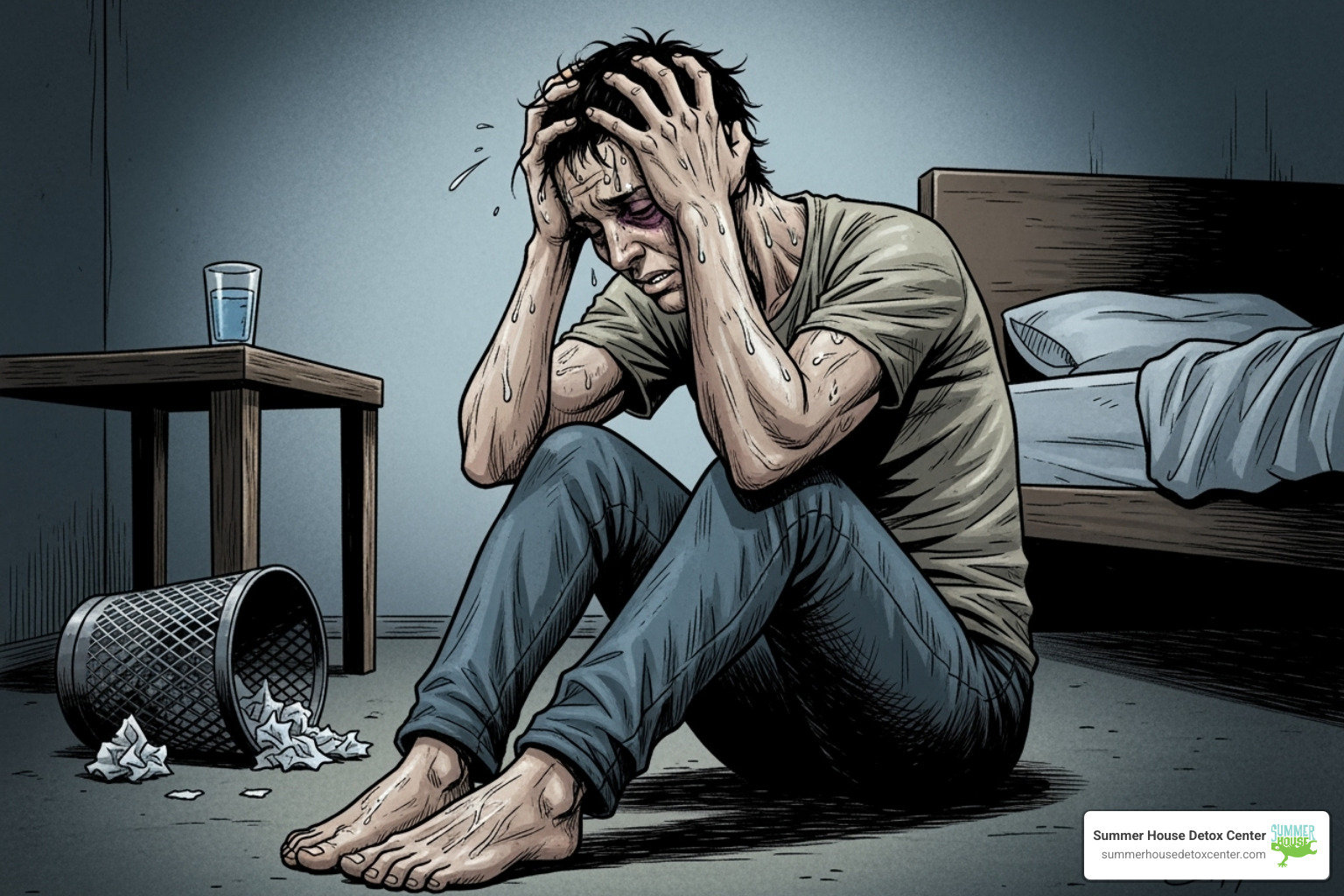Understanding the Reality of Methadone Withdrawal
How bad is methadone detox is a question that weighs heavily on anyone considering this crucial step toward recovery. The honest answer: methadone withdrawal can be one of the most challenging detox experiences, but it’s absolutely manageable with proper medical support.
Quick Answer: Methadone Detox Severity
- Physical symptoms: Flu-like feelings, muscle aches, nausea, sweating
- Duration: 2-3 weeks for acute phase, months for psychological symptoms
- Peak intensity: Days 3-8 after last dose
- Comparison: More prolonged than heroin withdrawal due to methadone’s long half-life
- Risk level: Rarely life-threatening but extremely uncomfortable without medical help
- Success factors: Medical supervision, gradual tapering, and supportive environment
Here in Miami and throughout Florida, many people fear the withdrawal process so much that they avoid seeking help altogether. One individual shared their experience: “I was sweating, twitching, and realized I was addicted to methadone after heroin. It felt like my body was in severe revolt.”
The truth is that methadone’s long-acting nature – with effects lasting 24-36 hours – means withdrawal symptoms start later but last longer than other opioids. Symptoms typically begin within 30-36 hours after your last dose and can persist for weeks without proper medical care.
But here’s what matters most: you don’t have to face this alone. With professional medical detox, what feels impossible becomes manageable. The key is understanding what to expect and having the right support system in place.

Simple how bad is methadone detox word guide:
Understanding the Methadone Withdrawal Experience

When people ask “how bad is methadone detox”, they want to know what to expect as their body and mind adjust. Your body has adapted to this long-acting opioid, and its absence causes your central nervous system to go into overdrive as it rebalances. Your brain has been relying on methadone to feel “normal.” When it’s removed, everything feels wrong. The physical symptoms are often described as the worst flu you’ve ever had, but it lasts much longer than a few days.
In Miami, patients describe the physical experience as overwhelming. The flu-like symptoms are severe: runny nose, watery eyes, yawning, and drenching sweats. Deep muscle and joint aches are common, as are goosebumps and chills, even in Florida’s warmth.
But the physical discomfort is just part of the story. The gastrointestinal distress can be particularly brutal—nausea, vomiting, diarrhea, and abdominal pain that makes eating or drinking feel impossible. This is why dehydration is a real concern, especially during our hot Florida summers.
Your central nervous system also kicks into high gear, causing restlessness, agitation, rapid heartbeat, and high blood pressure. You might notice your pupils dilating, and sitting still becomes nearly impossible.
The psychological impact hits just as hard. Anxiety can feel overwhelming, a constant sense of unease. Insomnia leaves you exhausted but unable to sleep. Many people become irritable, and the drug cravings can feel intense and all-consuming.
Perhaps most challenging is the depression that often accompanies withdrawal. Activities that once brought joy feel meaningless, and hope can feel distant. This is why professional support is essential.
While these symptoms are rarely life-threatening, their intensity makes daily life feel impossible and significantly increases relapse risk. That’s why medically supervised detox in a supportive environment like ours makes such a difference.
The First 24-72 Hours
The start of methadone withdrawal is deceptive. Unlike short-acting opioids, its long-acting nature means symptoms are delayed. While oxycodone withdrawal starts in hours, methadone’s can take 24 hours or more to begin.
This means symptoms typically don’t begin until 30 hours after your last dose, though it can take anywhere from 15 to 60 hours. This waiting period can create its own anxiety, knowing what’s coming.
During these first one to three days, symptoms start gradually. Restlessness and anxiety often appear first—a growing unease where you can’t get comfortable. You might find yourself pacing or constantly shifting positions.
The flu-like symptoms emerge: runny nose, watery eyes, and frequent yawning. Sweating becomes noticeable, especially in Miami’s humidity.
Despite feeling restless, a deep fatigue often sets in. Your body is already working hard to adjust, and this internal struggle is exhausting.
What many don’t expect is how psychological distress builds during this seemingly “mild” phase. The anxiety is about knowing symptoms will likely worsen before they improve.
Peak Withdrawal: Days 3-8
This is when people understand how bad methadone detox can be. Symptoms that started gently now peak, typically between days three and eight. Your body is fighting to function without the opioid it depends on.
The muscle cramps and aches become severe, often described as deep, persistent pain that makes any position uncomfortable.
Diarrhea and abdominal pain can become relentless. The stomach cramping is intense, and frequent trips to the bathroom are exhausting. Combined with nausea and vomiting, this creates a high risk of dehydration—something we monitor closely at our Miami facility.
Your cardiovascular system feels the strain, with a rapid heartbeat and high blood pressure that can make your heart feel like it’s racing. This is your nervous system’s hyperactivity at its peak, which is why medical monitoring is so important.
The intense cravings during this period can feel overwhelming. Your brain is screaming for methadone, and these urges can feel impossible to resist without support.
Emotionally, this phase brings significant turmoil: mood swings, peak irritability, and crushing anxiety. Depression often deepens, making everything feel hopeless even though relief is coming.
Research shows the first 7 to 10 days are typically the most challenging. This is why our team at Summer House Detox Center provides 24/7 medical supervision during this critical period—because no one should have to go through this alone.
The Timeline: How Long and How Bad is Methadone Detox?
Understanding the timeline is crucial when asking how bad is methadone detox. Methadone withdrawal follows a different pattern than other opioids, significantly impacting its duration and intensity.
Methadone is a long-acting opioid with a half-life of about 24 hours, compared to just four hours for shorter-acting opioids like oxycodone. This means methadone stays in your system much longer, creating a withdrawal experience that’s more of a marathon than a sprint.
While withdrawal from shorter-acting opioids may resolve within a week, methadone withdrawal unfolds over a longer period. The acute phase alone can last 14 days or more, and that’s just the beginning.

This extended timeline is a mixed blessing. Symptoms develop more gradually than with other opioids but persist much longer. Our Miami patients often describe it as discomfort that builds steadily and leaves slowly.
How bad is methadone detox during the acute phase?
The acute phase typically lasts two to three weeks, peaking between days 3 and 8. Afterward, symptoms gradually decrease in intensity over the next 10 days, but this decline is slow.
During these weeks, managing daily life is incredibly difficult. Persistent flu-like symptoms, GI issues, and emotional turmoil create a storm of discomfort. Simple tasks like dressing or eating can feel overwhelming.
This is why a controlled environment is so important. At our Miami facility, we’ve seen many people try to detox at home, only to struggle with basic self-care. The sheer duration of symptoms requires the consistent medical support and comfortable environment that only a professional detox center can provide.
The good news is that while the timeline is longer, medical supervision allows you to focus entirely on healing instead of managing symptoms alone.
Post-Acute Withdrawal Syndrome (PAWS) and Depression
After the challenging two to three weeks pass, the journey isn’t over. Post-Acute Withdrawal Syndrome (PAWS) is the next phase, where lingering symptoms can persist for months or even up to two years.
Unlike acute withdrawal, PAWS is primarily psychological and emotional. You might experience chronic anxiety, persistent insomnia, low energy, and fatigue that make enjoyable activities feel like chores.
A challenging aspect is anhedonia—the inability to feel pleasure. Favorite meals, a Florida sunset, or time with family might feel flat and colorless. This often leads to depression and feelings of hopelessness about returning to normal.
Drug cravings can also resurface unexpectedly during PAWS, triggered by stress or random memories. These cravings are frustrating after you’ve already completed acute withdrawal.
The connection between methadone withdrawal and these long-term psychological effects is well-documented. The Substance Abuse and Mental Health Services Administration provides detailed information about Protracted Withdrawal and its lasting impact.
In South Florida, where life can be and stressful, managing PAWS requires ongoing therapeutic support. The key is understanding that these symptoms are temporary and treatable—they are part of your brain healing from long-term opioid use.
Factors That Influence Withdrawal Severity in Florida
The severity of methadone detox varies dramatically from person to person. What is manageable for one can be overwhelming for another. We see this reality daily across Florida’s diverse communities, from Miami to smaller towns.
Several key factors determine the challenge of your withdrawal experience. Understanding these helps your medical team create the most effective, personalized detox plan.
Dosage and duration of use play the biggest role. High doses of methadone used for years will likely cause a tougher detox than lower doses for a few months. Deeper dependence makes the adjustment period longer and more intense.
Polysubstance use significantly complicates withdrawal. Using methadone with alcohol, benzodiazepines, or other drugs makes detox far more dangerous and unpredictable, as each substance has its own withdrawal pattern.
Your individual health factors matter enormously. Age, pre-existing medical conditions (like heart or liver disease), and even genetics influence symptom severity.
Co-occurring mental health conditions like anxiety, depression, or PTSD can make the psychological aspects of withdrawal feel unbearable and require specialized care.
| Feature | Abrupt Discontinuation (“Cold Turkey”) | Medically Supervised Tapering |
|---|---|---|
| Risks | High: Severe physical pain, mental distress, potentially dangerous health complications | Low: Gradual symptom management, medical monitoring, psychological support |
| Withdrawal Intensity | Extreme and unmanageable symptoms, overwhelming physical and psychological distress | Controlled, gradual reduction in symptoms with medical interventions |
| Relapse Risk | Very High: Unbearable symptoms often drive people back to drug use | Lower: Supportive environment and symptom management reduce relapse likelihood |
| Medical Complications | Severe dehydration, electrolyte imbalances, cardiovascular stress, potential for psychosis | Prevented through IV fluids, medications, and constant medical supervision |
| Success Rate | Poor: Most people cannot complete cold turkey detox | High: Medical support dramatically improves completion rates |
| Safety | Dangerous: Potential for life-threatening complications, especially with pre-existing conditions | Safe: 24/7 medical monitoring prevents and treats complications immediately |
Why Quitting “Cold Turkey” Is So Risky
Many people wonder if they can just stop methadone completely to “get it over with.” This thinking is incredibly dangerous.
Severe withdrawal shock hits your system when you stop methadone abruptly. The resulting physical pain and psychological distress can be overwhelming.
The high risk of relapse is almost inevitable with cold turkey attempts, as intense suffering makes using again seem like the only escape. This is dangerous, especially in Florida, because tolerance drops quickly during abstinence.
Increased overdose danger is a critical concern. Relapsing after tolerance has decreased can easily lead to a fatal overdose. This tragic outcome is common in unsupervised detox attempts.
Unmanaged complications can become medical emergencies. Severe vomiting and diarrhea lead to dangerous dehydration and electrolyte imbalances, which can be life-threatening without medical intervention.
There’s also a rare risk of psychosis with abrupt cessation, causing severe paranoia and anxiety that require immediate medical attention.
How bad is methadone detox for older adults?
For older adults in Florida, methadone detox is a more serious question. Age brings unique challenges that make medical supervision essential.
Slower metabolism means methadone lingers longer in older bodies, extending the withdrawal timeline and symptoms.
Pre-existing health conditions like heart disease or diabetes become more dangerous during withdrawal. The stress of detox can trigger serious medical crises in vulnerable older adults.
Increased risk of dehydration is particularly dangerous for seniors. The vomiting and diarrhea of withdrawal can quickly lead to kidney problems and other life-threatening issues.
Multiple medications can interact unpredictably with withdrawal symptoms, requiring expert medical oversight.
The psychological impact can be more severe, with confusion, disorientation, and increased anxiety being more common in this age group.
At our Miami facility, we understand these unique needs. Our medical team has extensive experience helping older adults steer methadone detox safely with specialized protocols that account for age-related vulnerabilities.
Navigating Detox Safely: Medical and Therapeutic Support
Understanding how bad is methadone detox can be makes the need for professional support clear. Going through it alone is not just difficult; it’s risky. The severe symptoms and long timeline make medical supervision essential.
At Summer House Detox Center in Miami, we’ve seen how transformative proper medical care can be. Our 24/7 monitoring provides a safety net that doesn’t exist at home. Medical detox offers critical advantages: managing symptoms with targeted medications, ensuring safety through immediate intervention for complications, and providing comfort and dignity to transform a traumatic experience into a healing one.
Our approach in Florida is deeply personal. Many of our experienced staff are in recovery themselves, bringing professional expertise and genuine understanding. This creates an environment where you can focus on healing, knowing your wellbeing is supported.
Therapeutic support begins immediately. Counseling helps address the psychological aspects of withdrawal during the acute phase, setting the foundation for long-term recovery.

Medical Interventions to Ease Withdrawal
Medically supervised detox makes withdrawal far more manageable. While medications don’t eliminate symptoms, they dramatically reduce their severity.
Clonidine is a lifeline during methadone withdrawal. It targets distressing symptoms like anxiety, restlessness, sweating, muscle aches, and a racing heart. By calming your overactive nervous system, clonidine helps restore a sense of control.
Gastrointestinal symptoms get targeted treatment. Loperamide helps manage diarrhea, while anti-nausea medications control vomiting, greatly improving comfort.
Sleep becomes possible with carefully chosen, non-addictive sleep aids. Rest improves your ability to cope with daytime symptoms.
Pain management with non-opioid medications addresses muscle aches. Combined with IV fluids and nutritional support, these interventions address the physical stress of withdrawal.
The most effective strategy is gradual tapering under medical supervision. This slowly reduces your methadone dosage, allowing your body to adjust gradually. As the National Practice Guideline for the Treatment of Opioid Use Disorder emphasizes, individualized tapering is crucial for success.
These interventions, combined with compassionate care, change the narrative around methadone detox from something to fear into something achievable.
Preparing for Your Detox Journey in Miami
Starting your detox journey in Miami requires courage and preparation. While we handle the medical complexities, you can support your own healing.
Setting realistic expectations is foundational. Methadone detox is a process of weeks, not days. There will be difficult, but temporary, moments. Being patient and compassionate with yourself is necessary for healing.
Building your support network before you begin makes a huge difference. Connect with trusted family, friends, or support groups like Narcotics Anonymous for emotional anchoring.
Mindfulness and meditation are practical tools for managing anxiety. Deep breathing and meditation can provide a mental refuge when symptoms feel overwhelming.
Light physical activity, once medically cleared, supports healing. Gentle walking around our Miami facility can improve mood and reduce stress.
Distraction techniques help manage cravings. Books, movies, or puzzles can redirect your focus during difficult moments.
Nutrition and hydration are vital. Stay hydrated, and when you can eat, choose nutrient-dense foods to support your body’s healing.
Professional counseling addresses the underlying psychological aspects of addiction. Therapy helps you develop coping mechanisms and build confidence for long-term recovery.
If symptoms become overwhelming, reaching out to your medical team immediately is the right choice. It’s smart self-advocacy that allows us to adjust your treatment for better comfort and success.
Conclusion
The honest answer to how bad is methadone detox is that it’s genuinely challenging – perhaps one of the toughest withdrawal experiences you’ll face. The physical discomfort can feel overwhelming, with flu-like symptoms, muscle aches, and gastrointestinal distress that can last for weeks. The psychological impact runs even deeper, with anxiety, depression, and cravings that can persist for months through Post-Acute Withdrawal Syndrome.
But here’s what we want you to know: detox is challenging, but it’s absolutely manageable with proper support. You don’t have to white-knuckle through this alone, and you certainly shouldn’t attempt to go cold turkey – that path leads to unnecessary suffering and dangerous complications.
At Summer House Detox Center here in Miami, we’ve walked alongside countless individuals through this exact journey. We understand that how bad is methadone detox feels depends largely on the support you receive. That’s why we provide round-the-clock medical monitoring, medications to ease your symptoms, and a team that truly gets it – many of our staff members have been where you are now.
Detox isn’t the finish line – it’s your starting point. It’s the brave first step toward reclaiming your life from dependence. With our personalized medical supervision, comfortable environment, and compassionate care, we transform what feels impossible into something entirely achievable.
The fear of withdrawal has kept too many people trapped for too long. You deserve to move forward with dignity, comfort, and hope. Your healthier, opioid-free future is waiting, and we’re here to help you reach it safely.
Ready to take that courageous first step? Find how our specialized and compassionate approach can make all the difference with our methadone detox services at Summer House Detox Center.
